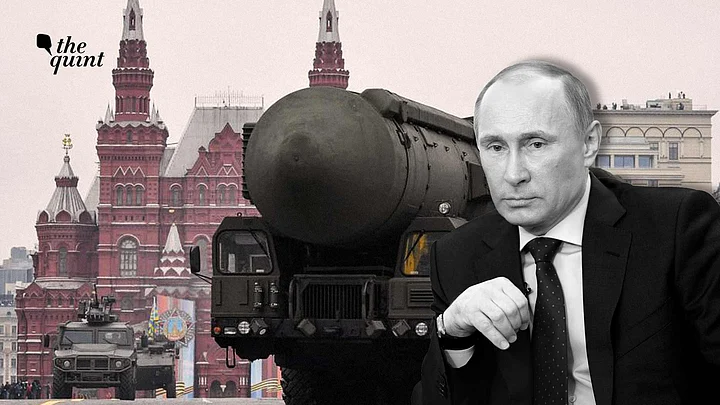The Russian invasion of Ukraine is still in its first week, and President Vladimir Putin drastically escalated tensions on Sunday, 27 February, by deciding to put Russia's nuclear forces on increased alert.
Putin made this announcement during a televised meeting with Defence Minister Sergei Shoigu and Chief of General Staff of the Russian Armed Forces Valery Gerasimov.
The Russian president justified his actions by referring to the sanctions that have been slapped on him, his aides, Russian banks, and financial institutions, and to the "aggressive statements" made by leaders of NATO member countries.
"Western countries aren’t only taking unfriendly actions against our country in the economic sphere, but top officials from leading NATO members made aggressive statements regarding our country", he said.
"Therefore I order the minister of defence and the chief of the general staff [of the Russian armed forces] to transfer the [nuclear] deterrence forces of the Russian army to a special mode of combat duty", Putin added.
It is a marked deviation from Putin's own nuclear doctrine, which, according to the Arms Control Association, established four criteria for Russia's nuclear option to be activated:
"When very existence of the state is in jeopardy"
"In response to the use of nuclear and other types of weapons of mass destruction against it and/or its allies"
In a situation of "ballistic missiles attacking the territory of the Russian Federation and/or its allies"
"Attack by [an] adversary against critical governmental or military sites of the Russian Federation"
None of these events have happened, nor have there been any indications whatsoever of the same.
The threat is also astounding because just less than a year ago, United States President Joe Biden and his Russian counterpart had agreed at the Geneva Summit that a nuclear war "can never be won", and "must never be fought".
But times change, and here we are. So, what does "special mode of combat duty" mean? What is the significance of the timing, that is, why is Putin choosing to escalate now?
What Does Higher Readiness Mean?
First and foremost, it is highly doubtful that Putin actually intends to launch a nuclear attack.
If that was the case, he wouldn't announce in advance that he has ordered his nukes to be on higher readiness.
The idea of putting nuclear forces on high alert is telling your adversary that you are prepared to respond on short notice if the adversary attacks, make it less likely for them to attack in the first place.
This is because an attack would risk nuclear retaliation, which would lead to devastating consequences.
Announcing nuclear readiness is essentially a move that scholars have conceptualised as 'nuclear deterrence', something that was regularly practised by the US and the Soviet Union during the days of the Cold War.
This doesn't mean that Putin's move isn't dangerous.
An analogy to understand the nuclear alert would be to think of nukes as guns. Higher readiness essentially means that the safety has been been removed.
The alert could also imply that Putin has ordered missiles to be capped with nuclear warheads or nuclear-armed submarines to be be leaving their stations.
With Russian troops storming the capital Kyiv and other cities like Kharkiv, why did Putin feel the need to make this extremely dangerous move?
Why the Escalation?
Putin's plan in Ukraine has been wrecked by the fierce resistance shown by the Ukrainian army, and all the civilians who have volunteered to fight the Russians.
Not only has Russia not managed to siege the capital despite two full days of fighting, but in the second-largest city, Kharkiv, the Russian troops have reportedly been repelled.
But what may have really blown Putin's fuse, that led him to order the nuclear alert, would be how popular support for Ukraine from the West is increasing day by day, and how punitive economic measures are being escalated against Russia.
The West has sending enormous amounts of aid to Kyiv to fight Moscow, with the US having already sent hundreds of millions of dollars to the Ukraine government and military.
Even Germany has announced that it will be sending weapons to Ukraine, reversing a long-standing policy of not sending or selling weapons to parties involved in conflicts.
Finland is considering doing the same, having already announced that it would send bulletproof vests, helmets, and stretchers.
The unity of Europe and the US as they firmly stand behind Ukraine in the face of Russian aggression has started to get under Putin's skin.
Experts also believe that more than military aid, the punitive economic measures may have provoked Putin to make such a drastic move.
The sanctions slapped against Putin, his aides, and many Russian banks, and new measures to cut off Russia from SWIFT, signals a global response to the invasion that Putin may not have foreseen.
His challenges at home, in the face of these sanctions, will increase. He will have to deal with high inflation and the public unrest that usually follows.
A final aspect to think about is that Ukraine and Russia are expected to hold talks in Belarus on Monday, 28 February.
Extracting maximum concessions from these talks may have guided Putin's nuclear threat.
The concessions could include Ukrainian President Volodymyr Zelenskyy's resignation along with the entire government's, along with Ukraine's de-militarisation and a pledge to remain neutral in Europe.
Whether the nuclear tactic works or not, one thing seems to be clear – Putin underestimated his adversaries.
Not only did he underestimate the kind of resistance that Ukraine would put up, but he also didn't foresee the unity and the resolve of the countries backing Ukraine.
If he thought that this war was going to be nice and quick, Putin, contrary to his reputation, has miscalculated big time.
(At The Quint, we question everything. Play an active role in shaping our journalism by becoming a member today.)
